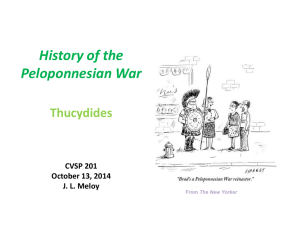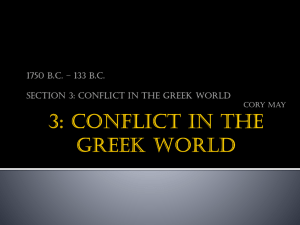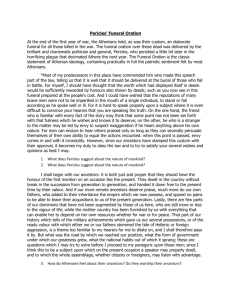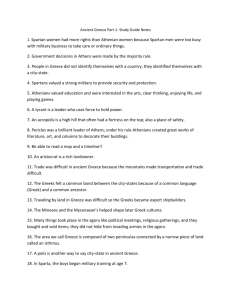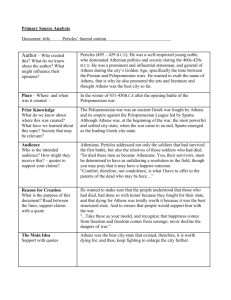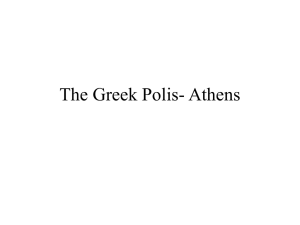Introduction - The University of Michigan Press
advertisement
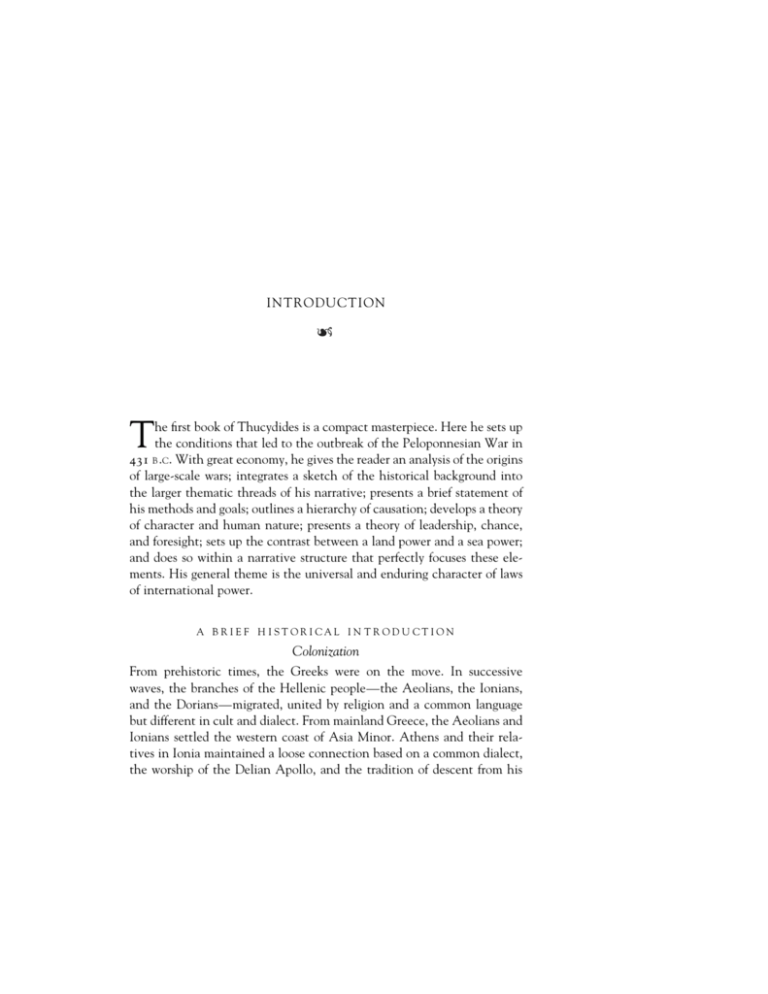
INTRODUCTION T he first book of Thucydides is a compact masterpiece. Here he sets up the conditions that led to the outbreak of the Peloponnesian War in 431 B .C. With great economy, he gives the reader an analysis of the origins of large-scale wars; integrates a sketch of the historical background into the larger thematic threads of his narrative; presents a brief statement of his methods and goals; outlines a hierarchy of causation; develops a theory of character and human nature; presents a theory of leadership, chance, and foresight; sets up the contrast between a land power and a sea power; and does so within a narrative structure that perfectly focuses these elements. His general theme is the universal and enduring character of laws of international power. A B R I E F H I ST OR I CAL I N T R OD U CT I ON Colonization From prehistoric times, the Greeks were on the move. In successive waves, the branches of the Hellenic people—the Aeolians, the Ionians, and the Dorians—migrated, united by religion and a common language but different in cult and dialect. From mainland Greece, the Aeolians and Ionians settled the western coast of Asia Minor. Athens and their relatives in Ionia maintained a loose connection based on a common dialect, the worship of the Delian Apollo, and the tradition of descent from his 2 T H U CYD I D E S B OOK I son Ion. About 1000 B .C., the Dorians spread through the Peloponnese and the southern Aegean Islands, a movement mythologized as the “Return of the Heraclidae.” From roughly the middle of the eighth century to the middle of the seventh, the cities of mainland Greece sent out settlements and founded colonies from the Crimea in the Black Sea to Marseilles in what is now France. They settled southern Italy and Sicily, with Ionian colonies, such as Leontini, in the north of Sicily and with Dorian cities, such as Syracuse, in the east and south. The opposition and rivalry between Dorians and Ionians is a major theme in Thucydides’ narrative. A colony maintained informal and formal connection with its mother city ). For instance, the annual magistrates of the Corinthian (µητροπολις colony Potidaea, on the westernmost prong of the three-pronged Chalcidice peninsula at the northern end of the Aegean Sea, were sent out each year from the mother city Corinth. The Ionian Revolt Their ancestral connection with the Ionians led the Athenians to come to the aid of their relatives in the Ionian Revolt of 499 B .C. The Ionian cities of Asia Minor had become subject to the Lydian Empire of Croesus, and with his defeat, they became subject in turn to the Persian Empire. The Athenians had aided in the burning of the Persian provincial capital, Sardis, and after the revolt was suppressed, the Persians mounted a punitive expedition against Athens, which was repulsed in the famous battle of Marathon in 490 B .C. The Persian Invasion Ten years later, when Xerxes was king of Persia, he mounted a massive invasion of Greece in retribution, crossed the Hellespont on a bridge of ships, drank dry the rivers of Thrace, was delayed temporarily by three hundred Spartans under Leonidas at the bottleneck pass of Thermopylae, and marched overwhelmingly into Attica, destroying Athens and dismantling its walls. But during the previous ten-year interval, Themistocles had come to preeminence. He had convinced the Athenians to use the windfall of a newly discovered vein of silver in the mines at Laurium to build ships. He convinced the Athenians to abandon the land to the Persians and evacuate the population by sea to the safety of adjacent islands. By Introduction 3 diplomacy, threats, and trickery, Themistocles managed to bring together in a fragile and shaky alliance all the navies of Greece, to defeat the Persian navy in the narrow sea room of Salamis. Xerxes retreated back across the bridge of ships over the Hellespont, leaving his ambitious kinsman Mardonius behind with a residue of the army, and Mardonius was defeated in the final land battle at Plataea in 479 B .C. by an allied army under the command of the Spartan Pausanias. After the Persian Retreat Over the objections of the Spartans and Corinthians and following the ingenious policy of Themistocles (Thuc. I.89–93), the Athenians quickly rebuilt their walls, including the fortifications of the harbor, the Piraeus (the Long Walls, connecting the city with the Piraeus, were built later). Exercising the traditional Spartan right to command, Pausanias led a joint Peloponnesian and Athenian naval expedition, which wrested Byzantium, a Greek colony, from Persian control. But as Thucydides relates (I.94–95), Pausanias was soon discredited, and the Spartans, weary with the burden of the war, withdrew from operations in the Aegean, leaving hegemony to the Athenians, who were only too happy to accept. Under the leadership of Cimon, they, with the aid of their Ionian allies, proceeded to sweep the Persian navy out of the Aegean. The Delian League With Athenian leadership, the cities and islands around the Aegean Sea formally organized to counter the Persian threat. The cooperative burden of defense was to be shared, and to the common effort, the members of this league contributed ships or, if more agreeable to them, money. The assessments, whether in ships or money, made for all members of the alliance by the Athenian Aristides were so equitable that he ever afterward enjoyed the nickname “the Just.” The money was kept in the shrine of Apollo on the sacred island of Delos. This Delian League, conceived as an alliance for mutual defense against Persia, gradually evolved into the Athenian Empire, in which the members were no longer independent allies but subjects. The studied Athenian policy was to encourage those members who contributed ships to substitute a monetary contribution, until only Lesbos, Samos, and Chios were left with a navy. 4 T H U CYD I D E S B OOK I As the Persian threat diminished, some members tried to withdraw from the league but were forced to become tributaries. Naxos, for example, left the league but was besieged and forced back into allegiance in 470–469 B .C. Thucydides (I.98) observes that for the first time, a member state lost its independence, contrary to the initial compact of the league, and that the Athenians continued to pursue this policy of reducing members of the league to subjects of Athens. The Rise and Fall of Cimon Themistocles, meanwhile, had been ostracized and then condemned in absentia, probably because he was involved somehow in the suspect business of Pausanias. Cimon then became the preeminent political and military leader in Athens. His decisive victory over the Persian navy at the Eurymedon River (467 B .C.) finally eliminated Persian presence in the Aegean. In 464 B .C., Sparta faced two serious crises: an earthquake and the revolt of the helots, Sparta’s large population of slaves, who had retreated to the fastness of Mount Ithome. Cimon’s conservative, oligarchical policy was friendly to the Spartans, and he offered to bring an Athenian force to help them. When his offer was rebuffed, he was discredited in Athens and, in 461 B .C., ostracized. The Rise of Pericles This was a turning point in Athenian policy. The fall of Cimon was engineered by the democrats under the leadership of Ephialtes and Pericles, and Athens turned anti-Spartan and expansionist. The helots on Ithome held out for years, frustrating Spartan efforts to dislodge them. Finally, in answer to an oracle, the Spartans agreed to allow them to leave the Peloponnesus safely with their wives and children, on the condition that they never return. Pericles cleverly settled them as Athenian colonists at Naupactus, near the mouth of the Corinthian Gulf. Here, then, was an Athenian colony athwart the lucrative trade route to Italy and Sicily. When Ephialtes and Pericles came to power, it marked a shift from conservative oligarchical policies to democratic policies. One of their first symbolic and practical moves was to reduce the function of the conservative Areopagus from general oversight of the government to their ances- Introduction 5 tral function as a homicide court. Aeschylus’s Oresteia was an element in popularizing the move. But it was not approved by all, and Ephialtes was murdered (461 B .C.). Pericles then emerged as the preeminent leader. Pericles’ Constitutional Position Pericles’ formal constitutional position was as a member of the annually elected Board of Ten Generals. Cleisthenes had reformed the Athenian constitution in 508–507 B .C. To break up the old political factions—called the Hill, the Coast, and the Plain—he created ten new political units ) composed of one-third from each faction, so compromise (tribes, φυλαι and cooperation within the tribe became necessary. Each tribe annually chose by lot fifty of its members to serve on the βουλη , a kind of executive committee, which saw to the day-to-day operation of the city-state and prepared the agenda for the legislative assembly ( εκκλησι α), the body of all voting citizens. Each tribe annually elected one of its members to the Board of Ten Generals, the military establishment of the city. While the magistrates and other officials came to be chosen by lot, the generals were elected on the basis of competence and thus could be reelected any number of times. While this office was Pericles’ constitutional base, his practical political effectiveness came from his forceful personality, his persuasiveness, his admitted foresight, his strategic talent, his recognized integrity, and the general respect that he commanded. As Thucydides puts it, “It was a democracy in word but the rule of its first citizen in fact” (II.65). From League to Empire It is something of an oversimplification to say that Athenian policy changed from pro-Spartan to anti-Spartan, but that was effectively what happened. In 454 B .C., the Athenians transferred the treasury of the Delian League from the sacred island of Delos to Athens, claiming that as long as they provided defense against the barbarians, they owed no accounting of the money to the allies (Plut. Per. 12 [158]). This is a crucial mark of the transformation from the voluntary alliance for mutual protection, the Delian League, to the Athenian Empire. Thucydides (II.63) has Pericles say to the Athenians in his last speech, “Your empire is now like a tyranny: if you think it was wrong to acquire it, to give it up is outright dangerous.” 6 T H U CYD I D E S B OOK I Athenian Expansion on Land The period from 461 B .C. to 446 B .C. is sometimes called the First Peloponnesian War, as Athens began effectively to surround Corinth by conquests and alliances, developing something of a land empire. It was short-lived, the advances were lost, and Athenian land expansion came to an end with the Thirty Years’ Truce of 446 B .C. This expansion had begun in 461 B .C. with an alliance with Argos, a traditional enemy of Sparta. Then Megara, the Doric city on the Aegean side of the Isthmus of Corinth, joined the Athenian alliance (459 B .C.). Thucydides (I.103) explains that this was the principal cause of the in tense Corinthian hatred (µι σος) of the Athenians. In 457 B .C., the Athenians won the battle of Oenophyta and conquered their northern neighbors Boeotia and Phocis. Next, the island of Aegina was added to the Athenian Empire (457–456 B .C.), as was Achaea, the territory flanking the south shore of the Corinthian Gulf. At Naupactus, where Pericles had settled the helots, the Athenians established a naval base commanding the mouth of the gulf on its north shore. A glance at the map concluding this book will show how completely Corinth was being surrounded. The Thirty Years’ Truce The reversal came when the Athenians were defeated in the battle of Coronea in 447 B .C., whereby Athens lost Boeotia. Megara then revolted. The long island of Euboea, which stretches along the flanks of Attica and Boeotia in the Aegean, revolted under the influence of Boeotian intrigue. Euboea, says Thucydides (VIII.96), was, as a base of supply and a refuge, more important than Attica itself, and consequently, its defection was serious enough for the Athenians to seek peace. By the provisions of the Thirty Years’ Truce (446 B .C.), Athens yielded up the territory and alliances it had recently acquired: Nisaea, Pegae, Troezen, and Achaea (Thuc. I.115). Neither side was to attack the other, and neither side was to interfere with the allies of the other. It is argued that a list of the allies of each was appended and that unlisted states were not covered by this provision (cf. Thuc. I.35.2, 40.2). This is a major point at issue between Corinth and Athens in the matter of Corcyra treated by Thucydides in book I. Thucydides (I.23.5–6) makes a distinction between the unexpressed την λογω ), truest cause (αληθεστα την προφασιν ) and the (αφανεστα ) that led to the breaking of the Thirty expressed causes ( ες το φανερον Introduction 7 Years’ Truce: respectively, namely, Spartan fear of Athenian expansion and the affairs of Epidamnus and Potidaea. The Affair of Epidamnus and Corcyra Epidamnus, on the eastern coast of the Adriatic in the vicinity of modern Durazzo, was a colony of the island of Corcyra. It had suffered a series of civil disturbances between the democrats (ο δηµος) and the oligarchs (ο ι δυνατοι ), until finally the former expelled the latter. The oligarchs, in turn, with external help from neighboring barbarians, besieged Epidamnus. The besieged democrats sent for help to their mother city, Corcyra, but were rebuffed. On the advice of the oracle at Delphi, the Epidamnian democrats next appealed to Corinth—their grandmother city, as it were, since Corcyra itself had been founded by Corinth. This time, their appeal was successful, because there was bad blood between Corinth and their undutiful colony Corcyra. This led to an odd situation in which Corinth, an oligarchical state, was supporting the democrats in Epidamnus, while Corcyra was supporting the oligarchs. With help from her allies, Corinth put together a navy of seventy vessels to oppose the Corcyrean navy of eighty (Thuc. I.29.4). The Corcyreans sought arbitration, but the Corinthians refused, which led to the first naval battle between them, off the islands of Sybota in 435 B .C., won by the Corcyreans (Thuc. I.29.5). As the Corcyreans learned that the Corinthians were putting together a Peloponnesian alliance and building ships for a second encounter, they began to be concerned that they themselves were without allies. They had been listed on neither the Athenian nor the Lacedaemonian side in the Thirty Years’ Truce. So they sent an embassy to the Athenians seeking such an alliance. The Corinthians, in turn, sent an embassy to persuade the Athenians to refuse, fearing that the Athenian navy would be added to the Corcyrean. The Athenians heard both sides in the assembly and decided for the Corcyreans. This led to a second naval battle off the islands of Sybota (433 B .C.), in which the Athenians played an ambiguous, but active, role. Did this constitute a breach of the Thirty Years’ Truce? The Affair of Potidaea The affair of Potidaea began with a cautionary measure taken by the Athenians after the naval battle of Sybota (Thuc. I.57.1). On the one hand, Potidaea was a Corinthian colony, situated on the isthumus of 8 T H U CYD I D E S B OOK I Pallene, the westernmost prong of the three-pronged Chalcidice peninsula, and its chief magistrates were sent out annually from the mother city Corinth. On the other hand, Potidaea was an ally of Athens of the tribute-paying class, a Dorian city in the Delian League, and therefore suspect. When the Athenians demanded that they send away the Corinthian magistrates, tear down the walls on the southern side of the city, and send hostages to Athens to guarantee their loyalty, the Potidaeans revolted. The Corinthians sent a contingent of volunteers to their aid by land, and the Athenians sent a naval force and a strong force of hoplites, heavy-armed troops. Eventually the Athenians succeeded in investing the city by land and sea. The incidents of Corcyra and Potidaea, then, led to the outbreak of the war. The Megarian Decree A third incident, the Megarian Decree, gets less attention from Thucydides. Megara had turned from a traditional relationship with Corinth, and in 459 B .C., it became an Athenian ally (Thuc. I.103). The Athenians came to Megara’s defense when Corinth attacked them in 458 B .C. But when Athenian fortunes were reversed in 446 B .C. with the revolt in Euboea, Megara defected and returned to its alliance with Corinth and the Peloponnesians. By the articles of the Thirty Years’ Truce, Athens gave up all the territorial advances it had achieved in the period of expansion. But the defection of Megara stuck in Athens’s craw, and Pericles issued the Megarian Decree, which interdicted Megara from all the ports of the Athenian Empire and from the Athenian marketplace itself (Thuc. I.139). Megara’s commercial outlet was toward the Aegean and the East, so this decree effectively destroyed the Megarian economy. P R I N CI P AL T H E M E S Money, Ships, and Walls The first book of Thucydides’ history is about money, ships, and walls. These three subjects weave their way through the text like counterpoint, resurfacing again and again. They are the necessary elements that make large-scale wars possible, according to Thucydides, and they are the secret of Athenian preeminence and endurance. The section called the Archaeology (I.2–19), which treats the early development of the political and military organization of Greece, empha- Introduction 9 sizes these three things: the need for walled cities for protection against pirates; the safety of the seas guaranteed by the ships of Minos; and the resulting commercial wealth from seaborne trade, which made possible the accumulation of surplus capital. These are precisely the elements necessary for large-scale wars. The section called the Pentecontaetia (I.89–117), a historical précis of the roughly fifty years between the final retreat of the Persians in 479 B .C. and the outbreak of the Peloponnesian War in 431 B .C., begins with the story of how Themistocles, Thucydides’ model of ideal leadership, succeeded by ingenuity, trickery, and alacrity in rebuilding the walls of Athens in the face of Spartan opposition. It was the sagacity of Themistocles that had earlier convinced the Athenians to use the profits from the newfound silver lode at Laurium to build ships in anticipation of the Persian threat. This made it possible for the Athenians in 480 B .C. to take the bold step of taking to the ships, abandoning the land of Attica to the invading Persians. Finally, in a later day, Pericles, a leader in the Themistoclean mold, adopted the strategy of encapsulating Athens within the Long Walls, abandoning the countryside to the ineffectual Spartan incursions and relying on the sea routes to supply Athens with Crimean wheat. This supply route passed through the narrows of the Hellespont, a geopolitical choke point for Athens. When the Spartans destroyed the Athenian navy at Aegospotami and finally controlled the Hellespont in 404 B .C., cutting off the vital trade route, the Athenians surrendered and the war came to an end. For Themistocles, the money came from the silver mines; for Pericles, the money came from the tribute paid to Athens by the subject cities and islands of the empire. Causation Polybius, the later historian of the Punic Wars of Rome, would eventually distinguish three different types of historical causation (3.6–7): pretext η ), and true cause (α ι τι α). These categories ), occasion (αρχ (προφασις are anticipated in Thucydides, although his terms are not as precise as those of Polybius. In Thucydides’ account, the Spartans demand that the Athenians drive out the curse of Cylon (I.126), and the Athenians counter with a demand that the Spartans drive out the curse of Taenarus (I.128). These are the pretexts, and Thucydides calls them προφασεις. The disputes over Corcyra (I.31–55) and Potidaea (I.56–65) and the 10 T H U CYD I D E S B OOK I Theban attack on Plataea (II.1–7) are the immediate occasions (α ι λεγοµεναι α ι τι αι) for the outbreak of the war. But according to Thucydi τη προφασις ) is Spartan fear of Athenian des, the true cause (η αληθεστα expansion (I.23). The True Cause—Corinthians An argument can be made that Thucydides got this wrong. It was not Sparta’s interests that were threatened, nor was Sparta eager for war. Rather, the Corinthians bullied, cajoled, and pleaded with the reluctant Spartans to lead a joint Peloponnesian campaign against Athens, because Corinthian interests were being threatened. There is archaeological evidence that in the mid–fifth century, the distinctive Corinthian pottery was being replaced by Athenian pottery in southern Italy, indicating successful Athenian commercial rivalry in the western Mediterranean, traditionally the economic sphere of Corinth. If Corcyra, which lies athwart the sea route from the Corinthian Gulf to Magna Graecia and Sicily, was allied with Athens, the threat to Corinth was severe. The Megarian Decree, by which Corinth’s Dorian commercial partner on the Aegean side of the Isthmus of Corinth was interdicted from all trade with the cities of the Athenian Empire, destroyed the economy of Megara. The plight of the Megarians is memorably represented by Aristophanes in the Acharnians (524–39, 729–835; cf. Peace 605–11). Spartan and Athenian Character In Thucydides’ account, when the Corinthians speak before the delegates of the Peloponnesian League at Sparta to urge resistance to Athens (I.68– 71), they lay out the thematic contrast between Spartan and Athenian character (η θος). The Spartans, they say, are naive in foreign affairs, passive, wedded to the status quo, hesitant, lacking in originality. But the Athenians, they say, are always innovators, quick in decision and resolve, risk takers, aggressive, always eager for more (πλεονεξι α). The Speeches In the forward of his 1629 translation of The Peloponnesian War, Thomas Hobbes says Thucydides is “one who, though, he never digress to read a Lecture, Moral or Political, upon his own Text, nor enter into men’s Introduction 11 hearts, further than the Actions themselves evidently guide him . . . filleth his Narrations with that choice of matter, and ordereth them with that Judgement, and with such perspicuity and efficacy expresseth himself that (as Plutarch saith [Mor. 347A]) he maketh his Auditor a Spectator.” Hobbes continues, “For he setteth his Reader in the Assemblies of the People, and in their Senates, at their debating; in the Streets, at their Seditions; and in the Field at their Battels.” Thucydides is regarded as the objective historian par excellence. Only rarely does he intrude with an opinion of his own (e.g., at I.23). But despite this objective manner, his own interpretation emerges from the speeches and the studied juxtapositions of his narrative. His analysis lies in the speeches, whether they are reports of speeches actually heard or only inventions of Thucydides—as he says (I.22), “what was appropriate τα δεοντα ]. M. I. Finley says, to the situation” [περι των α ι ε ι παροντων “to lay bare what stood behind the narrative, the moral and political issues, the debates and disagreement over policy, the possibilities, the mistakes, the fears and the motives, his main device was the speech” (introduction to Penguin translation, 25). Justice, Self-interest, and Gratitude The assembly debates recorded by Thucydides in book I tend to rest on two thematic pillars of argument: justice (δι κη) and self-interest (τα ξυµφεροντα). In the debate at Athens over Corcyra (I.32–43), the Corinthians argue, as a matter of justice, that an Athenian alliance with the Corcyreans would break the Thirty Years’ Truce. The Corcyreans, while denying that argument, point out that it is in Athens’s interest to have the Corcyrean navy on their side. There is also a variety of the argument from justice, which we may call the argument from gratitude (χαρις), as when the Corinthians remind the Athenians that they once gave them twenty warships with which to conquer Aegina (I.41) and that Athens is thus under obligation to them. προνοια, οργη , and τυχη According to Thucydides’ account (I.66–78), at the meeting of the Peloponnesian League at Sparta, the Corinthians urge action against Athens, and the Athenians answer with a justification of their empire and a thinly veiled warning about the unpredictable and the accidental in war (το 12 T H U CYD I D E S B OOK I παραλογον, τυχαι ). Then, the Spartan king Archidamus, a man of pru δοκων ει ναι και σωφρων ), with caution dent understanding (ξυνετος and foresight lays out for the Spartans in executive session (κατα σφας υς ) his assessment of the circumstances (I.79–86). As if confirming αυτο the Corinthian picture of Spartan character, he urges delay. However, this ) that the is not the usual cautious sluggishness (το βραδυ και µελλον Corinthians complained about, but the sensible prudence (σωφροσυνη εµφρων) that takes time to become realistically prepared. Archidamus argues that the Athenians have wealth and a navy and that it will be strategically futile to invade and devastate Attic land. ), By way of contrast with Archidamus’s virtue of foresight (προνοια Thucydides introduces the hotheaded jingoist ephor Sthenilaidas (I.86), who dismisses speech making and diplomacy and puts the question by playing on the passions of the assembly. They vote for war. The pronoia of Archidamus is trumped by the rashness ( οργη , I.140) of Sthenilaidas. Justice versus self-interest; Spartan character versus Athenian character; true cause, pretense, and occasion; foresight versus rashness; the unexpected and the accidental; money, ships, and walls—these are some of the structural themes that Thucydides sets up in book I, and he will ring the changes on them, sometimes ironically, throughout his history. Thucydides has caught—in the test tube, as it were, of this little war— the fundamental laws of international power. As long as human nature ωπινον ), these patterns will occur again remains the same (κατα το ανθρ and again. The future statesman who, like a physician, recognizes the symptoms can with foresight ease his city through the crisis. Thucydides ελιµα ) and a possession justifiably expects us to find his book useful (ωφ for all time (κτηµα ες α ι ει ). OBSERVATIONS ON GRAMMAR AND STYLE SP E L L I N GS F AV OR E D B Y T H U CYD I D E S instead of εαν ην instead of συν , both as preposition and as preverb ξυν ες instead of ε ι ς ¯ σσ ¯ instead of Attic ¯ ττ ¯ (e.g., θαλασσα instead of θαλαττα) ¯ ρσ ¯ instead of Attic ¯ ρρ ¯ (e.g., θαρσος instead of θαρρος) ι α ι ει instead of αε SOM E F E AT U R E S OF ST YL E Schema Thucydideum. Thucydides often likes to use a neuter participle or a neuter adjective instead of the corresponding abstract noun. E.g., το [fear] and το θαρσουν [boldness] (I.36.1; Sm. §1025); το πιστον δεδιος [confidence] (I.68.1). Such an expression may be modified by a genitive. το τιµωµενον [the dignity of the state] (II.63; Sm. E.g., της πολεως [the clear truth §2051); το σαφες των τε γενοµενων και των µελλοντων of what has happened and what will happen in the future] (I.22.4). Constructio ad sensum. A seeming violation of strict syntax, especially concord, can occur to serve the meaning. E.g., η γνωµη του Αρι στεως το 13 14 T H U CYD I D E S B OOK I µεθ εαυτου στρατοπεδον µεν εχοντι εν τω ισθµω επιτηρειν τους Αθηναι ους [The plan of Aristeus was to keep his army with him on the isthmus and keep an eye on the Athenians] (I.62.3). Here, the genitive του Αρι στεως is modified by the dative participle εχοντι as though η γνωµη του Αρι στεως was equivalent to εδοξε τω Αρι στει. The construction may also occur with possessive pronouns and adjectives, as in τα ν modifies the τα ν [our own resources] (I.82.1). The αυτω η µετερ αυτω by a construction according to sense. η µετερα The “lilies-of-the-field construction,” or prolepsis. “The subject of the dependent clause is often anticipated and made the object of the verb of the principal clause” (Sm. §2182), as in the biblical verse “Consider the lilies of the field, how they grow” [καταµαθετε τα κρι να του αγρου πως αυξουσιν ] (Matt. 6.28) instead of “Consider how the lilies of the field υς η αγγελ ι α των πολεων grow.” E.g., Ηλθε δε και τοι ς Αθηναι οις ευθ οτι αφεστα σι [and immediately there came to the Athenians news of the cities, that they were in revolt] (I.61.1). Avoidance of parallelism. Logically parallel ideas, which we might expect Thucydides to express in grammatically parallel constructions, are often . . . δε shifted off target with grammatical variation. For instance, in a µεν construction, the element introduced by δε may be of a different type ορων ξυνι part. E.g., Και το αλλο Ελληνικον from that in the µεν εκατερους ευθ υς , το δε και διανοουµενον σταµενον προς το µεν [[I, Thucydides,] seeing the rest of Greece taking one side or the other, some υς is immediately and some thinking about it] (I.1.1): the adverb ευθ η συχαζον ; [ο ι Κορι νθιοι] ουχ balanced by the participle διανοουµενον περι τω [[The Corinανδρω ν τε σφισι ν ενοντων και αµα χωρι ω δεδιοτες thians] did not refrain from action since they had citizens inside [Potidaea] and also out of fear for the territory] (I.67.1): The two elements joined by the τε . . . και are a genitive absolute and a nominative participle; επιτρεψοµεν ) α ι τιασθαι µητε πολεµον ως αγαν δηλουντας µηθ (κελευω [I advise you] to make our complaints known without either openly threatening war or [suggesting] that we will let them [do as they please]] (I.82.1) τους πολλους αρ ετην ) φερουσα ες µεν , ο ι ς δε επαµυνει τε and (δυναµις ν δ αυτοι χαριν, υµι ς ισχυν [[A power] bringing [to you a reputation for] virtue in the eyes of the world, thanks from those you will defend, and for yourselves strength] (I.33.2): the three grammatically nonparallel, but balanced, constructions are a prepositional phrase, a relative clause, and a dative. Observations on Grammar and Style 15 Historical present. The present tense can be used with past meaning. E.g., ο δε Θεµιστοκλης προαισθοµενος φευγει εκ Πελοποννησου ες Κερκυραν [Themistocles, getting wind [of this], fled from the Peloponnese to Corcyra] (I.136.1). Qualification of nouns by adverbs or phrases. E.g., η προτερον απραγµοσ υνη ι κα φανερω [our earlier noninvolvement] (I.32.5); τω αυτ [by something αφ η µων αξ ι ωσιν [the claim we apparent at the moment] (I.42.4); την are making] (I.37.1). Substantives formed by the neuter article. These are often translated by an abstract noun. E.g., το εφ εαυτων [their own interests] (I.17.1); το [piracy] (I.4.1). λ ηστικον Hyperbaton. Words that logically belong together may be displaced (Sm. §3028). ν τα επιτηδευµατα αυ For emphasis. E.g., αρχαι οτροπα υµω προς [Old-fashioned are your policies toward them] (I.71.2). τους γκη δε ωσπερ Inserted explanation. E.g., ανα τεχνης α ι ε ι τα επιγι γνοµενα κρατει ν [It is necessary, as in the case of any craft, for innovations always to win out] (I.71.3). δε επρεσβευοντο τω χρονω For rhythmical reasons. E.g., εν τουτω [And during this time they sent embassies] (I.126.1). Switching prepositions. Thucydides will use two different balanced preposi τους προς αλλους ες tions for the same meaning. E.g., αλλ ουτε ουτε ς τοιοι δε ε ι σι ν [Neither toward the others nor toward us are they like ηµα and ες mean the same. that [honorable]] (I.38.1). Here, προς OUTLINE OF BOOK I I. Chapter 1—Preliminary II. Chapters 2–19—Archaeology: Development of the political and military organization of Greece III. Chapters 20–23—Discussion of his methods and assessment of the importance and the causes of the war IV. Chapters 24–65—The immediate causes of the war A. Corcyra: 24–55 1. Speeches at Athens (a) Corcyreans: 32–36 (b) Corinthians: 37–43 B. Potidaea: 56–65 V. Chapters 66–88—First debate at Sparta (four speeches) A. Corinthians: 68–71 B. Athenians: 73–78 C. Archidamus: 80–85 D. Sthenilaidas: 86 VI. Chapters 89–117—Pentecontaetia: History of the years 479– 432, from the retreat of the Persians to the outbreak of the war VII. Chapters 118–25—Second congress at Sparta A. Second speech of the Corinthians: 119–24 VIII. Chapters 126–38—Stories of Pausanias and Themistocles A. Affair of Cylon: 126–27 16 Outline of Book I 17 B. Curse of Taenarus and the Brazen House (Pausanias): 128–36 C. Themistocles: 136–38 IX. Chapters 139–46—Speech of Pericles
